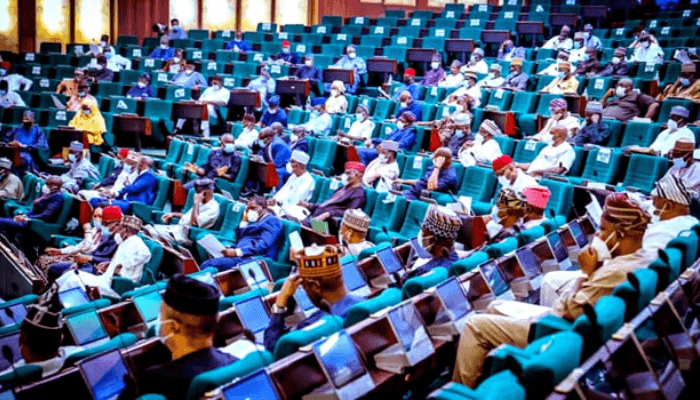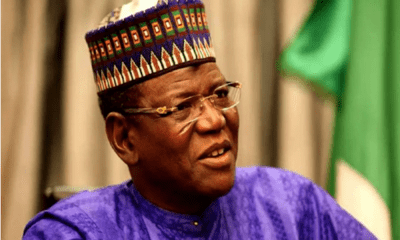News
Inmates rehabilitation will curb insecurity in Nigeria – NCoS
News
Tinubu targets increased gas production, unveils plants in Delta, Imo


President Bola Tinubu will commission three critical gas infrastructure projects undertaken by the Nigerian National Petroleum Company Limited and its partners.
They are the AHL Gas Processing Plant 2 in Delta State, the ANOH Gas Processing Plant, and the ANOH-OB3 CTMS Gas Pipeline Projects in Imo State. The gas projects have a combined estimated output of 1,400 million standard cubic feet per day.
Special Adviser to the President on Media and Publicity, Ajuri Ngelale, disclosed this in a statement he signed Friday titled ‘President Tinubu to commission critical gas infrastructure projects.’
“The projects support the federal government’s effort to grow value from the nation’s gas assets while eliminating gas flaring…and deepen domestic gas supply as a critical enabler for economic prosperity,” said Ngelale.
The AHL Gas Processing Plant 2 is an expansion to the Kwale Gas Processing Plant, which currently supplies about 130MMscf/d of gas to the domestic market.
The processing plant is designed to process 200MMscf/d of rich gas and deliver lean gas through the OB3 Gas Pipeline. However, the facility already injecting gas is scheduled to ramp up to 180mmscfd by the end of May.
Ngelale said this additional gas supply will “support further rapid industrialisation of Nigeria” and also “produce about 160,000 MTPA of Propane and 100,000 MTPA of Butane, which will reduce the dependency on LPG Imports.”
The AHL Gas Plant is being developed by AHL Limited, an incorporated Joint Venture owned by NNPC Limited and SEEPCO.
Meanwhile, the ANOH gas plant is an integrated 300MMscf/d capacity gas processing plant designed to process non-associated gas from the Assa North-Ohaji South field in Imo State.
The plant will produce dry gas, condensate, and LPG. The gas from the ANOH plant will significantly increase the domestic gas supply, leading to increased power generation and accelerated industrialisation.
The ANOH Gas Plant is being developed by ANOH Gas Processing Company, an incorporated Joint Venture owned by NNPC Limited and Seplat Energy Plc on a 50-50 basis.
With the facility mechanically completed in December 2023, the NNPC says it is finalising pre-commissioning activities.
Third is the ANOH-OB3 CTMS Gas Pipeline Project, which the Presidency said involves the engineering, procurement, and construction of 36”x23.3km ANOH-OB3 Project.
“The Transmission Gas Pipeline will evacuate dry gas from the Assa North-Ohaji South primary treatment facility to the OB3 Custody Transfer Metering Station for delivery into the OB3 pipeline system,” read the statement.
About 600MMscf/d is estimated to be available from two separate 2 x 300MMscf/d capacity gas processing production trains from AGPC & SPDC JV.
The 23.3km Anoh-OB3 PPL is scheduled for mechanical completion by May 15, 2024.
When commissioned, the projects will increase gas supply to the domestic market by approximately 500mmscf/d, creating a better investment climate and promoting balanced economic growth cumulatively, the Presidential Spokesman affirmed
News
House of Reps to review laws, practices restricting press freedom


The House of Representatives said on Friday that it would review the laws and practices restricting press freedom and the ability of the media to carry out its constitutional role in the country.
Rep. Akin Rotimi, Chairman, House Committee on Media and Public Affairs, said this while delivering a keynote address, to mark the 2024 World Press Freedom Day organised by the Konrad Adenauer Stiftung, Nigeria.
Rotimi said the legislature would prepare the ground for journalists to operate without any hindrance provided they adhere to the tenets of their profession.
“We will enhance good governance practices, transparency and
accountability through media chats, public hearings, town hall meetings, etc., amongst other scheduled legislative actions in Agenda 6,” he said.
The International Press Freedom Day, celebrated every May 3, is a day of reflection among media professionals and stakeholders on issues of press freedom and professional ethics.
Rotimi said that the 10th House of Representatives led by Speaker Tajudeen Abbas, had resolved to work with the media to ensure a successful running of the present government.
He said that the 1999 Constitution of the Federal Republic of Nigeria (as amended) conferred on the press a critical role as contained in Section 22 regarding obligations of the mass media.
“The role states that the press, radio, television and other agencies of the mass media shall at all times be free to uphold the fundamental objectives in this chapter and uphold the responsibility and accountability of the government to the people.
“Amongst many other challenges in the course of the discharge of this constitutional mandate, the press faces a disproportionate exposure to harm in the face of the widespread insecurity challenges in the country.
“There are also issues around the dearth of funding but I call on all stakeholders to continue with concerted efforts to address these challenges.
“There is no gainsaying that there are many miles to cover as far as media freedoms in our country is concerned but we have greatly improved from the days of military intervention in our polity (particularly, 1983 – 1998),” Rotimi added.
He urged the media to encourage introspection and self-regulation, and also look at the self-defeating ways that the press delegitimises their own struggle by not upholding ethics, and address them.
Mr Lukas Laible, Deputy Resident Representative, Konrad Adenauer Stiftung, Nigeria, said the press had become the enabler of Nigerian democracy.
“May 3 of every year is an important day for journalists as freedom of speech is the beacon of the practice.
“Without freedom of speech there won’t be freedom of press, and without freedom of the press, no society can be free.
“Journalists don’t just cover events, they are the people’s transmitter and they show capability in handling issues. They hold political leaders accountable and that is what makes democracy viable.
“Holding political leaders accountable enhances good governance. If the press fails to hold the government accountable, it will deviate from the people,” Laible said.
According to him, the press is so much trusted by the people and as such must make the people know the value of a free world.
Mrs Franca Aiyetan, Secretary, Nigerian Broadcasting Commission (NBC), who spoke during a panel session, urged journalists to always do their job in a way that would not consume the people.
Aiyetan, while speaking on the theme “Navigating the Intersection of Media Regulations, Press Freedom Advocacy and Ethical Journalism in the Face of Environmental Crises”, noted that NBC was established to have a formidable Nigerian media.
She said that NBC was not established as an attack dog for the government and as such would want the press to always work with it.
“If a detail about a truth will set two tribes against each other, then, there is something wrong with that truth.”
Another panelist, Mrs Mojirayo Ogunlana, the Executive Director, Digicivic Initiative, said journalists needed laws that should protect them while discharging their job.
“Threats to the lives of journalists should be declared as a state of emergency,” Ogunlana added.
She urged media practitioners to self-regulate themselves to prevent the government from exploiting any vacuum that could give it the opportunity to pounce on them.
News
Stop using repressive laws to intimidate journalists – SERAP, NGE tell FG


The Socio-Economic Rights and Accountability Project, SERAP, and Nigeria Guild of Editors, NGE, have called on Nigerian authorities at all levels of government to stop using repressive and anti-media laws to target, intimidate and harass journalists, critics and media houses.
The groups made the demand after an interactive session on ‘the state of press freedom in Nigeria’ held at the Radisson Blu Hotel in Ikeja.
In a joint statement, SERAP and NGE said that, “the government of President Bola Tinubu, the country’s 36 governors and FCT minister must now genuinely uphold press freedom, ensure access to information to all Nigerians, obey court judgments, and respect the rule of law”.
They expressed concerns about the escalating crackdown on the right to freedom of expression and media freedom and the flagrant disregard for the rule of law by authorities at all levels of government.
The groups note that the suppression of the press in recent times takes various forms ranging from extrajudicial to unlawful detentions, disappearances, malicious prosecutions and wrongful use of both legislation and law enforcement.
The statement read in part: “We would continue to speak truth to power and to hold authorities to account for their constitutional and international obligations including on freedom of expression and media freedom.
“Nigeria as a country has a long and unpleasant history of press gagging and clampdown on media freedom, which is evidence of extensive state censorship of media and in some cases, the utter control of state-owned media houses.
“This position has not changed considerably despite almost 25 years of unbroken democratic rule in the Fourth Republic.”
-
capital market2 years ago
Rt.briscoe, FBNH, Others halts negative performance of stock market
-
Finance3 months ago
Court orders Sen. Victor Umeh to repay N136m bank debt to AMCON
-



 Abuja Update2 months ago
Abuja Update2 months agoUNDP, FG partnership needed to achieve inclusion, equity- Minister
-
Abuja Update1 month ago
Banks drive stock market performance with N147bn gain
-



 Business2 weeks ago
Business2 weeks agoTingo Group unveils Tingo Electric, Tingo Cola drink at Lagos launch
-



 Health2 weeks ago
Health2 weeks agoCapacity training will reduce migration of health workers- NPHCDA
-
News4 months ago
Oil thieves sponsoring malicious media campaign against Navy – Spokesman
-



 Infotech1 month ago
Infotech1 month agoWorld Backup Day: NITDA urges Nigerians to ensure backup of data
















